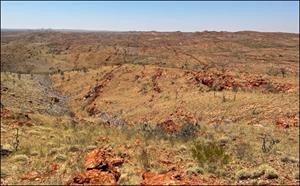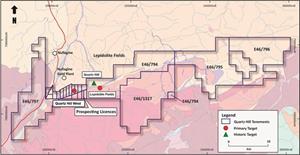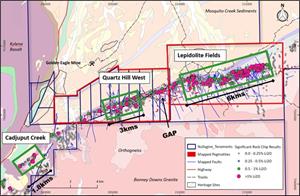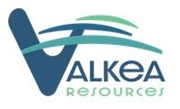Novo: Lithium Exploration Update 2024 Quartz Hill Joint Venture
HIGHLIGHTS
- Liatam intends to spend ~A$6 million during 2024 to progress lithium exploration at the Quartz Hill Joint Venture
- Exploration to date extended known lithium mineralisation at the Lepidolite Fields LCT pegmatite swarm target with best results from surface sampling by Liatam of:
- 2.71% Li2O, and 828 ppm Cs2O
- 2.37% Li2O, 303 ppm Ta2O5 and 883 ppm Cs2O
- 2.14% Li2O, 615 ppm Ta2O5 and 1,195 ppm Cs2O
- 1.98% Li2O, 277 ppm Ta2O5 and 882 ppm Cs2O
- 1.64% Li2O, 651 ppm Ta2O5 and 2,390 ppm Cs2O
- 1.24% Li2O, 722 ppm Ta2O5 and 1,722 ppm Cs2O
- ~9,000 m RC Drilling planned to test the ~ 6 km long and 0.8 km wide Lepidolite Fields LCT pegmatite swarm in H2 2024
- A second LCT pegmatite swarm was identified at Quartz Hill West and The Gap with best surface results of:
- 2.45% Li2O and 589 ppm Cs2O
- 2.23% Li2O, and 1,290 ppm Cs2O
- 1.22% Li2O, 181 ppm Ta2O5 and 780 ppm Cs2O
Commenting on the JV with Liatam, Mike Spreadborough Executive Co-Chairman and Acting Chief Executive Officer said
“Novo is pleased that Liatam continues to progress the Quartz Hill Joint Venture with ~A$6 million to be spent on exploration during 2024 and that plans are underway to identify further lithium bearing pegmatites at Quartz Hill. Activities to date have validated the exciting potential of the area and we look forward to providing updates as exploration continues. Novo’s ongoing exposure to future exploration and discovery success on battery metals projects via JV agreements is a core component of delivering long-term shareholder value.”
VANCOUVER, British Columbia, May 29, 2024 (GLOBE NEWSWIRE) — Novo Resources Corp. (Novo or the Company) (ASX: NVO) (TSX: NVO) (OTCQX: NSRPF) is pleased to provide an update on the exploration activities carried out and forward exploration program at the Quartz Hill Joint Venture in the Eastern Pilbara, Western Australia by the Company’s JV partner Liatam Mining Pty Ltd (Liatam).
The Quartz Hill Joint Venture is an 80% / 20% unincorporated joint venture between Liatam and Novo relating to battery minerals. This joint venture was formalised on 20 December 20231, when Liatam exceeded the required earn-in expenditure amount. Liatam is the owner of the included tenements and manager of the joint venture.
QUARTZ HILL JOINT VENTURE
The Quartz Hill Joint Venture comprises five granted Exploration Licences and eighteen Prospecting Licences, covering approximately 702 sq km (Figure and 2). Field based exploration to date confirms the area is highly prospective for LCT-style (lithium-caesium-tantalum) pegmatite hosted lithium mineralisation.
Exploration activities at Quartz Hill commenced in April 2023. Work conducted to date includes fact mapping, collection and assay of 2,068 soil samples and 3,181 rock samples (float2), and analysis of 25 petrological samples.
Detailed geological mapping and surface sampling has delineated numerous pegmatite swarms within two key exploration areas over strike lengths of several kilometres; both areas are considered prospective for further exploration including drilling by Liatam (Figure 3).
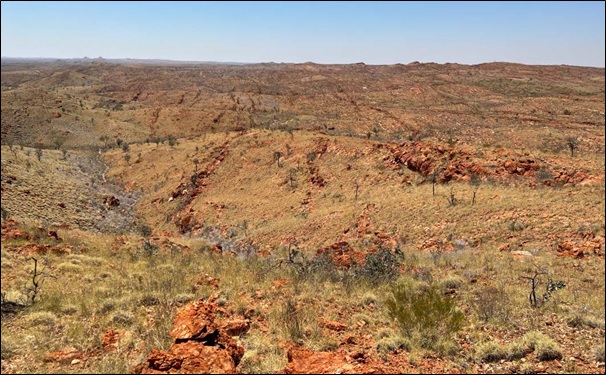
Figure 1: Photo of pegmatite swarms at the Lepidolite Fields LCT Target (looking southeast)
_______________
1 – Refer to the Company’s news release – 20 December 2023.
2- Float – The Traditional Owners of the Quartz Hill Project area have requested to not physically “crack” rock samples from outcrop prior to completion of a heritage survey. However, they are comfortable with the collection of representative loose rock samples lying on the ground for the purpose of geochemical analysis.
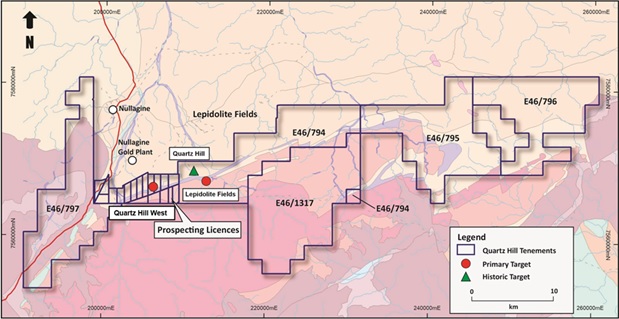
Figure 2: Quartz Hill Joint Venture tenement map identifying primary LCT pegmatite targets on 1:100,000 GSWA interpreted geology map.
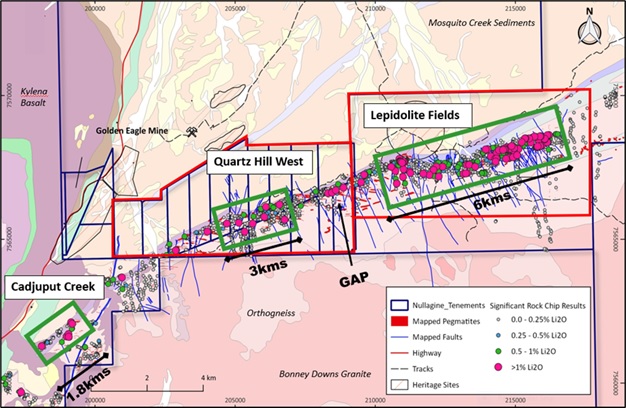
Figure 3: Lepidolite Fields and Quartz Hill West exploration areas identified through mapping and surface sampling.
Lepidolite Fields
The Lepidolite Fields LCT pegmatite swarm is 6 km long, 0.8 km wide and is defined by highly anomalous float rock samples with encouraging surface assays (Table 1).
The target is located approximately 10 km from the Golden Eagle mine site. Mapping has identified lepidolite bearing pegmatite swarms hosted by the Golden Eagle Orthogneiss and minor amphibolite enclaves.
The Lepidolite Fields pegmatites are typically medium grained, consisting of feldspar (albite and microcline), quartz and lesser muscovite with lepidolite, tantalite and cassiterite. Lepidolite up to 30% in outcrop has been observed. Amblygonite and to a lesser extent eucryptite are identified through petrology as alteration minerals.
Table 1: Lepidolite Fields selected rock float results
| Sample ID | Northing | Easting | Li2O | Cs2O | Ta2O5 | SnO2 | Nb2O5 |
| GDA94 Z50 | GDA94 Z50 | % | ppm | ppm | ppm | ppm | |
| PILRK001330 | 212,183 | 7,567,528 | 2.71 | 828 | 45 | 141 | 70 |
| PILRK002857 | 214,609 | 7,568,120 | 2.37 | 883 | 303 | 79 | 100 |
| PILRK002791 | 214,957 | 7,568,173 | 2.14 | 1195 | 615 | 56 | 124 |
| PILRK000682 | 213,353 | 7,567,591 | 2.02 | 436 | 78 | 240 | 77 |
| PILRK000908 | 214,845 | 7,568,135 | 2.02 | 797 | 218 | 63 | 67 |
| PILRK000890 | 214,768 | 7,568,197 | 1.99 | 560 | 160 | 178 | 80 |
| PILRK002788 | 214,826 | 7,568,190 | 1.98 | 882 | 277 | 58 | 94 |
| PILRK001413 | 211,716 | 7,567,282 | 1.97 | 419 | 24 | 154 | 60 |
| PILRK002806 | 214,622 | 7,568,167 | 1.9 | 1056 | 517 | 61 | 119 |
| PILRK000889 | 214,663 | 7,568,181 | 1.74 | 961 | 582 | 55 | 117 |
| PILRK002790 | 214,816 | 7,568,149 | 1.72 | 1045 | 492 | 60 | 117 |
| PILRK002784 | 214,954 | 7,568,190 | 1.72 | 1165 | 433 | 53 | 102 |
| PILRK002787 | 214,853 | 7,568,191 | 1.67 | 1074 | 443 | 58 | 100 |
| PILRK002639 | 216,203 | 7,568,624 | 1.64 | 2390 | 651 | 25 | 149 |
| PILRK002691 | 216,142 | 7,568,618 | 1.57 | 1988 | 564 | <10 | 126 |
| PILRK002643 | 216,145 | 7,568,609 | 1.55 | 2072 | 553 | <10 | 130 |
| PILRK000742 | 216,198 | 7,568,624 | 1.41 | 2059 | 613 | 18 | 133 |
| PILRK000745 | 216,082 | 7,568,353 | 1.37 | 413 | 216 | 42 | 24 |
| PILRK002526 | 210,971 | 7,567,738 | 1.35 | 1709 | 511 | 391 | 73 |
| PILRK002731 | 215,880 | 7,568,582 | 1.32 | 2240 | 625 | 20 | 134 |
| PILRK002758 | 215,358 | 7,568,509 | 1.31 | 1067 | 652 | 19 | 157 |
| PILRK002734 | 215,683 | 7,568,573 | 1.24 | 1722 | 722 | <10 | 166 |
| PILRK002759 | 215,340 | 7,568,506 | 1.23 | 1879 | 695 | 15 | 129 |
The above results are not necessarily representative of mineralisation across the district. A full list of results is included in Appendix 1.
The pegmatites at Lepidolite Fields are typically stacked, with thickness ranging from 0.1 m up to 5 m. The thicker pegmatites are shallow dipping towards the south while the thinner pegmatites generally dip steeply towards the north to northwest. Detailed mapping and sampling have identified five priority drill targets in the Lepidolite Fields target area.
Quartz Hill West and The Gap Targets
Quartz Hill West is located approximately 8 km to the west of Lepidolite Fields (Figure 2).
The target is defined by float samples anomalous in lithium, collected from numerous pegmatite swarms, with encouraging surface assays (see Table 2).
Table 2: Quartz Hill West and “The Gap” selected rock float results
| Sample ID | Northing | Easting | Li2O | Cs2O | Ta2O5 | SnO2 | Nb2O5 |
| GDA94 Z50 | GDA94 Z50 | % | ppm | ppm | ppm | ppm | |
| PILRK001157 | 206,764 | 7,565,681 | 2.45 | 589 | 39 | 408 | 170 |
| PILRK003389 | 208,506 | 7,567,304 | 1.22 | 780 | 181 | 119 | 59 |
| PILRK003390 | 208,538 | 7,567,290 | 2.23 | 1290 | 103 | 109 | 56 |
| PILRK003028 | 208,593 | 7,566,707 | 2.06 | 1754 | 6 | 89 | 17 |
The above results are not necessarily representative of mineralisation across the district. A full list of results is included in Appendix 1.
Mapping has identified pegmatite swarms over a strike length of 3 km (open along strike to the east and west) and the swarm is up to 0.5 km wide. Mineralised pegmatites have also been identified over 2km strike at “The Gap” (Figure 2). Pegmatites are stacked, with thickness ranging from 0.1 m up to 3 m and are hosted by foliated amphibolite with sedimentary interbeds.
The Quartz Hill West pegmatite composition is typically feldspar (albite and microcline), quartz and muscovite. Accessory minerals include lepidolite. The Quartz Hill West pegmatites are richer in quartz and muscovite in comparison to the lepidolite-rich pegmatites at Lepidolite Fields.
Forward Exploration Program
Helicopter supported heritage and ethnographic surveys are anticipated to commence in H2 2024 contingent on weather conditions and heritage considerations.
Reconnaissance mapping and surface sampling is planned to fill sampling gaps from the 2023 exploration campaign. This will include areas to the east of Lepidolite Fields where pegmatite swarms are identified in geophysical data sets but do not outcrop.
A regional, conventional soil sampling program is designed to assist in identifying buried pegmatite swarms in areas of no or poor outcrop at Cadjuput Creek, Quartz Hill West / Lepidolite Fields, and regional targets.
On completion of the required heritage and ethnographic surveys clearances, and advanced geochemical targeting, RC drilling is scheduled for H2 2024 to test high-priority targets identified within Lepidolite Fields. Various pegmatite swarms are to be drill tested targeting potential spodumene mineralisation below significant Li2O float surface samples returned in 2023.
A drilling contractor has been identified to undertake approximately 9,000 m of RC drilling over the key Lepidolite Fields targets, contingent on heritage and ethnographic surveys.
Helicopter supported reconnaissance and mapping will continue to allow access to the more remote parts of the Quartz Hill Project areas and prioritise further follow up sampling and mapping of pegmatites prior to drill testing.
Authorised for release by the Board of Directors.
CONTACT
| Investors: Mike Spreadborough +61 8 6400 6100 info@novoresources.com | North American Queries: Leo Karabelas +1 416 543 3120 leo@novoresources.com | Media: Cameron Gilenko +61 466 984 953 c.gilenko@morrowsodali.com |
Sampling & Analytic Methodology
Rock chip samples collected by Liatam were approximately 1 to 3kg and were dried, crushed and pulverized (80% passing 75 microns). Prepared samples are fused with sodium peroxide and digested in dilute hydrochloric acid (Sodium Peroxide Fusion- Labcode FUSNLi – Na2O2 fusion). The resultant solution was analysed by ICP by Jinning Testing and Inspection Laboratory in Maddington, Perth primarily for Be, Cs, Fe, Li, Nb, Rb, Ta and Sn using ICP-OES finish including majors in addition to Lithium and ICP-MS finish from same digest solution for key trace elements.
Jinning Testing and Inspection Laboratory in Perth used Certified Reference Materials (CRMs) and/or in house controls, blanks, splits, and replicates which are analysed with each batch of samples. These quality control results are reported along with the sample values in the final report. CRMs including STD samples were inserted by Liatam Mining. The insertion rate for the field CRM’s and blanks was 1 in 50 for float samples. This is considered as industry standard.
All data was verified without limitation by a qualified person by reviewing analytical procedures undertaken.
QP STATEMENT
Mr Iain Groves (MAIG), is the qualified person, as defined under National Instrument 43-101 Standards of Disclosure for Mineral Projects, responsible for, and having reviewed and approved, the technical information contained in this news release. Mr Iain Groves is Novo’s Principal Geologist – Technical and Generative.
JORC COMPLIANCE STATEMENT
The information in this news release that relates to exploration results at the Quartz Hill Joint Venture is based on information reviewed and approved by Mr Iain Groves, who is a full-time employee of Novo Resources Corp. Mr Iain Groves is a Competent Person who is a member of the Australian Institute of Geoscientists. Mr Iain Groves has sufficient experience that is relevant to the style of mineralisation and the type of deposits under consideration and to the activity being undertaken to qualify as a Competent Person as defined in the 2012 Edition of the ‘Australasian Code for Reporting of Exploration Results, Mineral Resources and Ore Reserves’. Mr Iain Groves consents to the inclusion in the news release of the matters based on her information in the form and context in which it appears.
FORWARD-LOOKING STATEMENTS
Some statements in this news release may contain “forward-looking statements” within the meaning of Canadian and Australian securities law and regulations. In this news release, such statements include but are not limited to planned exploration activities and the timing of such. These statements address future events and conditions and, as such, involve known and unknown risks, uncertainties and other factors which may cause the actual results, performance or achievements to be materially different from any future results, performance or achievements expressed or implied by the statements. Such factors include, without limitation, customary risks of the resource industry and the risk factors identified in Novo’s annual information form for the year ended December 31, 2023 (which is available under Novo’s profile on SEDAR+ at www.sedarplus.ca and at www.asx.com.au) and in the Company’s prospectus dated 2 August 2023 which is available at www.asx.com.au. Forward-looking statements speak only as of the date those statements are made. Except as required by applicable law, Novo assumes no obligation to update or to publicly announce the results of any change to any forward-looking statement contained or incorporated by reference herein to reflect actual results, future events or developments, changes in assumptions or changes in other factors affecting the forward-looking statements. If Novo updates any forward-looking statement(s), no inference should be drawn that the Company will make additional updates with respect to those or other forward-looking statements.
ABOUT NOVO
Novo is an Australian based gold explorer listed on the ASX and the TSX focused on discovering standalone gold projects with > 1 Moz development potential. Novo is an innovative gold explorer with a significant land package covering approximately 7,000 square kilometres in the Pilbara region of Western Australia, along with the 22 square kilometre Belltopper project in the Bendigo Tectonic Zone of Victoria, Australia.
Novo’s vanguard Project is the Egina Gold Camp, where De Grey is farming-in at Becher and surrounding tenements through exploration expenditure of A$25 million within 4 years for a 50% interest. Significant gold mineralisation has also been identified at Nunyerry North, this area is part of the Croyden JV (Novo 70%: Creasy Group 30%).
With a dedicated and disciplined acquisition program in place to identify value accretive opportunities and via its exposure to non-core minerals and metals through joint partnerships, Novo is focused on building further value for shareholders.
Appendix 1: Pegmatite float rock assay results from Quartz Hill Project Area is available at http://ml.globenewswire.com/Resource/Download/e41f91f4-4e2c-4929-8f8b-9e748272ecc6
Appendix 2: JORC Code, 2012 Edition – Table 1 is available at http://ml.globenewswire.com/Resource/Download/80bec153-83c1-4e31-923f-38d72df0c745
Photos accompanying this announcement are available at:
https://www.globenewswire.com/NewsRoom/AttachmentNg/0ed47497-04dc-4bb7-819c-fc8f737c72c8
https://www.globenewswire.com/NewsRoom/AttachmentNg/095d9b45-8f1d-44df-9606-a2b4963ce6a5
https://www.globenewswire.com/NewsRoom/AttachmentNg/0f33afb7-36c0-4b8b-9cdf-f3c95bde163a

Figure 1: Photo of pegmatite swarms at the Lepidolite Fields LCT Target (looking southeast)
Figure 1: Photo of pegmatite swarms at the Lepidolite Fields LCT Target (looking southeast)
Figure 2: Quartz Hill Joint Venture tenement map identifying primary LCT pegmatite targets on 1:100,000 GSWA interpreted geology map.
Figure 2: Quartz Hill Joint Venture tenement map identifying primary LCT pegmatite targets on 1:100,000 GSWA interpreted geology map.
Figure 3: Lepidolite Fields and Quartz Hill West exploration areas identified through mapping and surface sampling.



